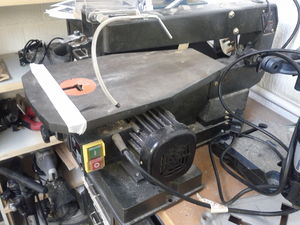Equipment/Scrollsaw
This is a small vibration saw that has been loaned to the hackspace by Charles Seber. He's an excellent artist, woodworker and grower. [1]
I've laser-cut a few things for him, and when he heard that the laser was out of action, he loaned us this saw. Please look after it.
Status
Both should work. One needs a new plate fitted. Can be made carefully in the way Mikechislett did out of thin perspex or Mentar volunteered to make a new one out of metal :P
Spare blades can be found in the sawblades drawer of the filing cabinet in the workshop.
There should be oodles and oodles of various blades but mostly 24tpi and 18tpi blades with a few 10tpi blades for rough cuts.
Model
NUTOOL SS16-4 Scroll SAW Serial #: 008445
Looks like 5inch(127mm) blades fit.
The current configuration needs pinned blades.
In theory non-pinned blades could be used with a different attachment, we don't seem to have it, so make sure you buy blades with pins not "plain end"
Instructions
Mind your fingers!
Like the bandsaw, you can adjust the tension of the sawblade by tightening/loosening the handscrew at the back of the machine.
Do not overtighten it! This will cause the blade to snap! Also pushing material into the blade too hard will cause the blade to snap. Or twisting the material at an odd angle. This is why the blades are consumables and you should wear appropriate eye protection when using the scroll saw.
You can check the tension with the power to the machine OFF by "pinging" the blade... pluck it with your finger nail and listen. It should be a fairly high, sharp, clear note. If it's a bit "thud" sounding, tighten the blade with the handscrew at the back, plucking the blade as you go so you can get an ear for a well tensioned blade.
Cutting
If in doubt then please ask
Please only cut thin/small pieces of wood or similar soft materials.
Acrylic will cut in this saw very effectively, but it makes a lot of mess. When cutting acrylic/plastic, you should go slowly - the blade will heat up quickly and cause the material to melt rather than cut if forced into the blade too hard or fast.
You can adjust the cutting angle of the saw by up to 45degrees, by using the handscrew on the front of the machine. This can make very effective bevels and corner joints.
Please clean the saw after you have used it. -Brush it down all over with a dustpan brush and then sweep off the dust into a dustpan. Remember to sweep up the floor too!
Changing the blade
Always observe the safety precautions described below.
Tools required: 5mm allen key, gloves, safety glasses
- Disconnect the saw from the mains.
- Wear gloves and eye protection at all times - this includes anyone helping or watching.
- Loosen the handscrew at the back of the saw.
- Remove the old blade.
- Make sure the clamp at the top is aligned correctly.
- Insert the sawblade with the cutting edge of the teeth facing downwards.
- Insert the sawblade pins in the bottom clamp.
- Gently stretch the sawblade until the pins slip into the top clamp.
- Tighten the handscrew to put tension on the blade.
- Using some tape, make a note on the machine of the current blade TPI.
- From a safe position, reconnect the power and activate the saw to verify that it is running correctly.
Tips
Consumables
- Purchasing:
http://www.axminster.co.uk/proxxon-scroll-saw-blades-with-pin-ends
Captcha's not working to make this a proper link but the current blades are from www.shesto.co.uk/product_info.php?products_id=1715
